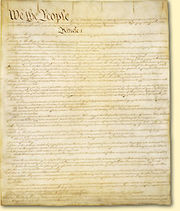Difference between revisions of "Self-governance"
(→Levels of self-governance) |
|||
| Line 1: | Line 1: | ||
[[Image:Constitution.jpg|thumb|right|180px|The constitution was written in plain-language for a self-governing people]] | [[Image:Constitution.jpg|thumb|right|180px|The constitution was written in plain-language for a self-governing people]] | ||
| − | '''Self-governance''', or '''self-government''' refers to activities that free | + | '''Self-governance''', or '''self-government''' refers to activities that free [[citizen]]s should take time to do that are rooted in civic engagement and knowledge of what one's national, state, and local government are up to. |
| − | Lack of engaging in self-government activities leads to a "professional" politician class. If citizens refuse to | + | Lack of engaging in self-government activities leads to a "professional" politician class. If citizens refuse to govern themselves then someone will be glad to take up the task of governing them. |
[[Image:TeaPartyByFreedomFan.JPG|thumb|right|180px|The Tea Party protests of 2009/2010 are examples of self-government.]] | [[Image:TeaPartyByFreedomFan.JPG|thumb|right|180px|The Tea Party protests of 2009/2010 are examples of self-government.]] | ||
| Line 12: | Line 12: | ||
*Protesting ([[Tea parties]], [[March for Life]], etc.) | *Protesting ([[Tea parties]], [[March for Life]], etc.) | ||
| − | *Knowing one's history of American | + | *Knowing one's history of American [[limited government]] (reading the [[Federalist Papers]] and other documents) |
*Calling or writing one's representatives | *Calling or writing one's representatives | ||
*Attending local, state, and national governing sessions | *Attending local, state, and national governing sessions | ||
| Line 25: | Line 25: | ||
==See also== | ==See also== | ||
| + | *[[Freedom]] | ||
| + | *[[Liberty]] | ||
*[[Sovereignty]] | *[[Sovereignty]] | ||
*[[Subsidiarity]] | *[[Subsidiarity]] | ||
| − | |||
[[Category:Conservatism]] | [[Category:Conservatism]] | ||
| + | [[Category:Libertarianism]] | ||
| + | [[Category:Virtues]] | ||
Revision as of 15:48, December 9, 2017
Self-governance, or self-government refers to activities that free citizens should take time to do that are rooted in civic engagement and knowledge of what one's national, state, and local government are up to.
Lack of engaging in self-government activities leads to a "professional" politician class. If citizens refuse to govern themselves then someone will be glad to take up the task of governing them.
A lack of self-government leads to unaccountable bureaucracies, Progressivism, authoritarianism, and ultimately despotism.
Examples
Examples of self-governing activities include:
- Protesting (Tea parties, March for Life, etc.)
- Knowing one's history of American limited government (reading the Federalist Papers and other documents)
- Calling or writing one's representatives
- Attending local, state, and national governing sessions
- Attending grass-roots events, conventions, and planning sessions
- Election functions above and beyond election day (GOTV, primaries and caucuses)
- Voting
Most activities of self-governance do not happen on election day.
Levels of self-governance
Self-government can refer to several levels of autonomy: A Nation's right to self-govern in light of globalism. A state's right to self-govern in light of over-zealous national government. A local government's right to self-govern in light of over-zealous state government. An individual's right to self-govern in light of any out of control, oppressive regime.

